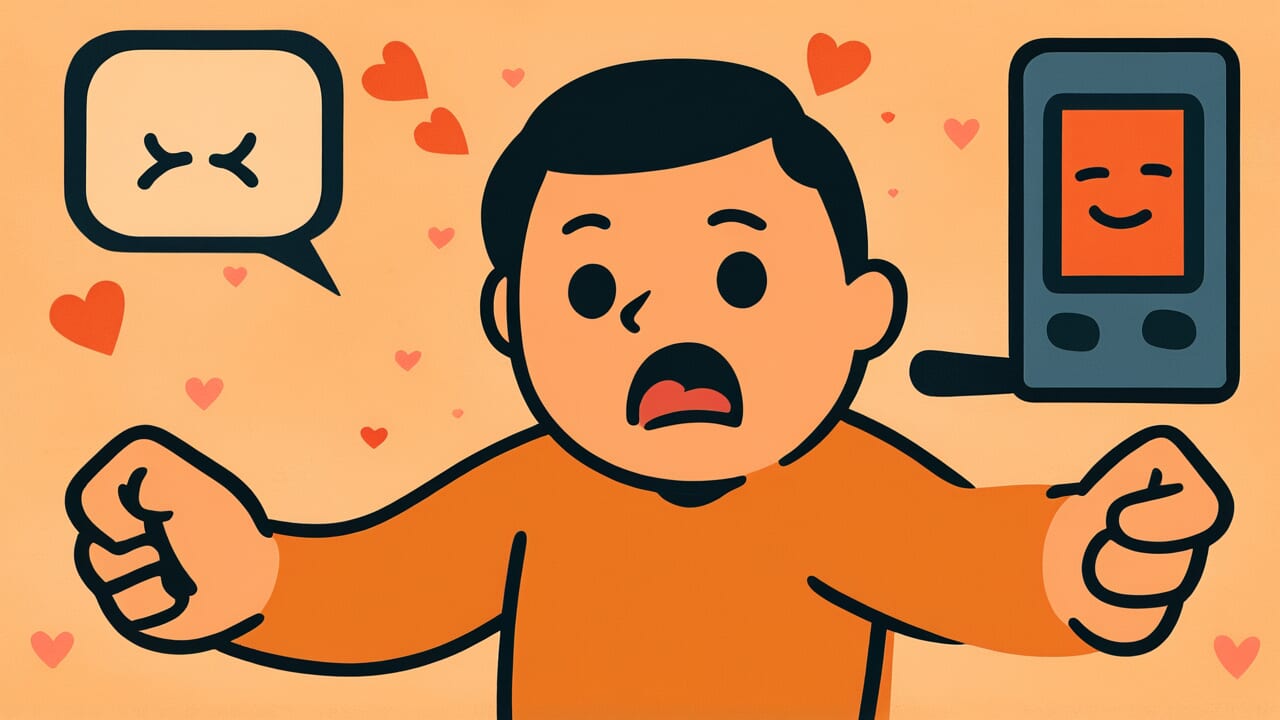How to Read “Irritation is a habit of love”
Iratsu wa koi no kuse
Meaning of “Irritation is a habit of love”
“Irritation is a habit of love” is a proverb that describes how people in love become easily irritated. This is a natural reaction that comes with romantic feelings.
When you fall in love, you can’t stop thinking about the other person. Even normally calm people lose their composure.
You get restless when they don’t contact you. Every little thing they say or do affects your mood dramatically.
This state is something everyone experiences when in love. The proverb shows understanding of this universal human experience.
People use this saying when they see someone acting irritable because of love. Instead of criticizing them for being “unlike themselves,” it warmly accepts this as natural.
You can also use it to console yourself when love disturbs your peace of mind. “This is just a habit of love, so it can’t be helped.”
Even today, everyone experiences emotional instability in love. This wisdom continues to be passed down as understanding of a natural human reaction.
Origin and Etymology
There are no clear records of when this proverb first appeared in literature. However, we can make interesting observations from how the words are structured.
The word “iratsu” is used today as “iradatsu,” meaning to be irritated. In older times, people also used the form “iratsu.”
It describes a state where your heart won’t settle and you feel driven by impatience. The word “kuse” (habit) refers to actions or tendencies you repeat unconsciously.
This proverb likely came from deep observation of how love affects people. Japanese classical literature repeatedly depicts people in love acting differently than usual and losing their composure.
From Heian period poetry and stories to Edo period literature, the emotional turmoil of lovers was an important theme. This proverb is a crystallization of human understanding born from such long observation.
By calling the irritation everyone experiences in love a “habit,” it shows this is not something special. It’s a natural human reaction.
The proverb contains the wisdom of ancestors who watched the universal human activity of romantic love with warm eyes.
Usage Examples
- She’s been restless lately, but irritation is a habit of love, so let’s watch over her warmly
- I can’t believe how unsettled I am waiting for a reply from someone I like—irritation is a habit of love, as they say
Universal Wisdom
The proverb “Irritation is a habit of love” contains deep insight into human emotions. Why do even normally calm people lose their composure when they fall in love?
It’s because romantic love is one of the most fundamental human emotions.
Falling in love means entrusting your peace of mind to another person. One reaction from them can bring you joy or anxiety.
You’re tossed about by emotional waves you can’t control. This state reveals the essential part of human nature that reason cannot suppress.
This proverb has been passed down through generations because it expresses a timeless truth. No matter how advanced civilization becomes, no matter how rational we try to be, love changes people.
We become irritated, impatient, and anxious. This isn’t weakness—it’s proof of our humanity.
Our ancestors expressed this unavoidable human nature with the word “habit.” A habit is something you can’t easily fix even when you try consciously.
In other words, they acknowledged that irritation from love is a natural reaction built into humans that can’t be suppressed. This understanding itself is kindness toward people in love.
It also leads to tolerance in forgiving ourselves. Through the universal experience of love, humans have learned the depth of their own emotions and developed empathy for others.
When AI Hears This
When you fall in love, your brain releases large amounts of dopamine, a pleasure chemical. All information about the other person gets processed as “important signals.”
Neuroscience calls this “sensitization”—when neural circuits become sensitive to specific stimuli. Small gestures or words from your loved one that you’d normally ignore get amplified in your brain.
What’s more interesting is what happens to your prefrontal cortex. When it’s constantly working at full capacity thinking about the other person, its control over the amygdala weakens.
The amygdala processes emotions and normally acts as a danger sensor. During love, this warning system becomes hypersensitive to the other person’s actions.
They left you on read. They’re three minutes late for your date. Trivial events feel like major incidents because of this.
Research shows that brain activity patterns in early-stage love resemble those of people with obsessive-compulsive disorder. Your attention fixates on a specific target and you can’t shift your focus away.
Because you love them, the amount of information you notice about them increases dramatically. As a result, “irritation” increases proportionally.
This is evidence that your brain recognizes them as someone special. It’s a neurological sign showing the strength of your affection.
Lessons for Today
This proverb teaches modern people the courage to accept emotional fluctuations. You don’t need to blame yourself for losing composure when you fall in love.
It’s a natural human reaction.
Modern society often demands that we stay calm and rational at all times. On social media, we present perfect versions of ourselves.
Being an adult who controls emotions is considered a virtue. But this proverb teaches us something different.
Being shaken by emotions is proof you’re alive. It’s what makes us human.
What matters isn’t denying your emotions but understanding them. If you can recognize “I’m irritated right now because I care about this person,” you won’t be overwhelmed by those feelings.
When friends or family in love act differently than usual, you can watch over them warmly instead of criticizing them.
Not just in love, but whenever you become passionate about something, you change. Having passion means letting go of peace of mind.
This proverb gently tells you it’s okay not to be perfect. It’s okay to be emotional.
Don’t be afraid to live like a human being.



Comments